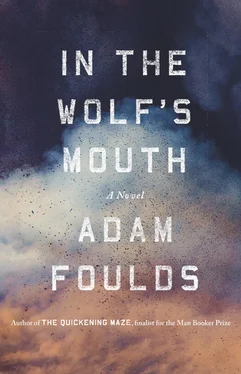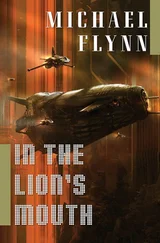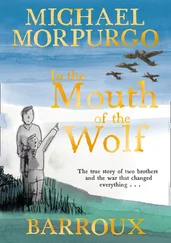Two more soldiers were collected. With a flashlight, they found a small wooden door that seemed likely to be the way into the cellar. Against stifled protests, Cirò pressed his head to the wood. He could feel them in there, their shifting animal presence. He nodded.
Major Kelly was not a coward. He arranged himself in front of the door, lifted the latch and gently pulled it open. With the flashlight in his left hand and his pistol in the right, he stepped in and down. After a few steps, the others heard him say. ‘Okay, you two, get up and move or I shoot.’
Cirò shouted the phrase in Italian and heard them move. Some bumping and scraping and two men now climbed the steps ahead of Kelly. An old man held up his arms as though to ward off blows. One of the soldiers grabbed his collar and yanked him out. The other was a boy of fighting age. He grabbed the lapels of one of the soldiers and started pleading. The soldier pushed him off.
‘Please, please, please don’t. We’re innocent. We’re just peasants. We’re not …’
‘What’s he saying?’
‘He’s saying they’re innocent.’
‘Yes, yes. Innocent.’
The old man bowed rapidly, affirming this. He reached out and put his hands on Cirò’s shoulder, large, dirty hands, the fingers knotted and kinked by years of labour. Cirò didn’t move. He looked the old man in the eye and said quietly, ‘Don’t touch me.’ The old man started backwards. He looked at Cirò then looked carefully away, his mouth open. Cirò smiled. He was a man of respect. They still knew. Cirò was home.
‘Don’t worry about it,’ he told the major. ‘They’re not going to be trouble. They live here.’
North Africa had been like a sports field for war, a baseball diamond for the movements of tanks and planes and eighty-eights. At night it was floodlit with flares. Sicily was terrible, so crowded. There were refugees on most of the roads. Having been dispossessed of their truck by an artillery unit, Ray’s group resorted to appropriating a couple of carts and mules from some fleeing peasants. Brightly painted with figures and scenes, the carts looked like something from the funfair. Their owners stood on the side of the road with their luggage round their feet and new packets of cigarettes and chewing gum in their hands. Ray and the AMGOT officers now pursued their course at the sway-backed, breathing, ancient pace of farm animals. Geminiano had taken the reins on Ray’s cart. He whipped them up and down, shouted ‘Giddeyup!’ and pretended to spit like a cowboy, ‘Hwit-ding!’ Ray shouted up at him, ‘Hey, this is Italy, remember. Don’t you know your own country?’
‘Not mine. This is Sicily. Come on, horsey.’
‘Not mine either.’
The whole place was ancient, just like his parents had said. Passing through the liberated towns, the doorways were full of hungry children who came out to beg for food and cheer them. Their clothes and faces — they looked exactly like the children in the family photographs in the dresser in the hall, stiff cardboard images of rigid Pugliese families, dark eyes, moustaches and oiled hair, heavy beaded dresses, hands immobile forever on knees and solemn children standing in knickerbockers, thick socks and polished boots. Most of these clothes, his mother explained, would have been hired for the occasion. Here these children were now, famished in the middle of a war. On the walls behind them, already defaced, were posters of Mussolini. They shouted at Ray in his parents’ language. Believe! Obey! Fight!
The peace was colliding with the war. AMGOT Civilian Affairs Officer William Walker had run into the thick of it. There was shellfire, minefields, wreckage, prisoners sitting on the side of the road with their hands on their heads. There were people and parts of people around stains of burning. The force of it was insane, the excess of it. It came out of nowhere, out of the air, out of the ground. It was what everybody here was supposed to do. People ran with stretchers.
They were stuck now, delayed. Ahead of them was a battle over a bridge, Germans on one side, Allies on the other, like a game you would play with lead soldiers or the war Will’s father fought in. The battle was stubborn and grinding. It had two jaws. It was eating men. Vehicles raced towards it. Samuels suggested playing cards while they waited.
They waited for two days. The sounds were terrible. Will was increasingly angry. The lassitude, he thought, was making him sensitive. He could feel his heart pumping in his chest, the sweat forming on his skin. He looked at his hands, the fingers in three parts, curling towards him. He heard the men being killed. Ambulances raced. It was horrifying, horrifying and boring. Maybe this was what produced his father’s heroism: boredom, all those hours in the dugout, in the mould and damp hearing the weapons and doing nothing, going out of your mind. In the end you were bound to break out. Will fancied that he could have done the same, rushed out and taken a machinegun nest on his own. He clenched his molars together hard, stifling a yawn.
Will walked around. He spoke to people. He smoked cigarette after cigarette, his pulse becoming light and fast.
The fighting changed in intensity. A spastic firing dropped away almost to silence, a quiet spattered with light gunfire followed by some bursting shells then quiet again. Will heard that on the third night they had stopped fighting and through some negotiation agreed to let each other come forward and collect their dead. He was told this by a soldier who couldn’t stand still. In the darkness his cigarette brightened and faded as he pulled on it. He thanked Samuels for the booze and swallowed it. He said that the men had walked past each other in silence, ignored each other, picked up the dead and the larger parts of the dead by torchlight and carried them away. They did this for a few hours. Afterwards, in the widening light of dawn, they began firing again.
Eventually, somehow, the Allies pushed through. The Germans were outkilled. The bridge was repaired by engineers and the weight of the stalled invasion rolled slowly forwards. Will didn’t look at the place as they drove through. He didn’t want to see it. It ought to be private in some way or concealed. It was obscene and degrading what had happened there. It felt possibly contagious. Will didn’t want to breathe in until they were through to the other side, in clearer air, picking up speed.
Luisa hurried through the house and out onto the terrace to see what it was she was hearing, matching the glinting aircraft with the throbbing sound. She saw their wings flash as they banked, saw them sprinkle tiny bombs that fell all the way down and sprouted as grey cabbages of smoke. A few instants later the noises of the explosions arrived one by one. The sound was like someone bumping down the servants’ wooden stairs.
The war was getting closer. The servants were all terrified. Prince Adriano pretended not to be, striding back and forth with his hands behind his back and the wireless on, proud and useless, like a chicken in a peasant’s yard.
Luisa watched as much as she could. It thrilled her. It filled her body. She came in breathless, with her teeth chattering. At night she could see the pulses of red tracer fire, she could see fires in the darkness.
Retreating Germans gathered near the palace for a while. Luisa could see them from one window at the top of the house. The Prince was terrified that they would requisition the place but they never did. A few of them came to ask for some water. Afterwards, Graziana was hysterical. When she’d opened the door, she said, she thought that there were ghosts standing there. Their hair was completely white. Their eyes were as pale as the sky, their skin cracked and falling off.
Читать дальше












